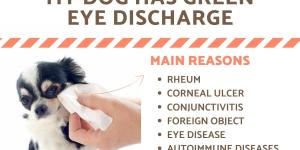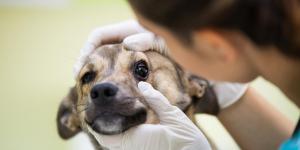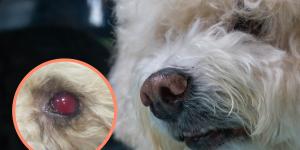My Dog's Eyes Are Bloodshot

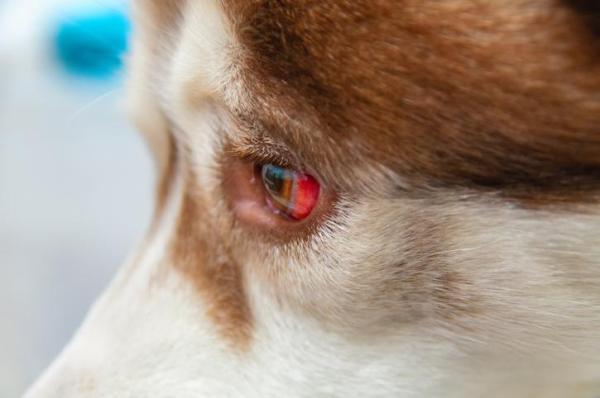

See files for Dogs
If we see a dog's eyes are red, we should look to whether the eyeball is bloodshot or if there redness is from their third eyelid. This third eyelid is the nictitating membrane, located in the lower portion of their eyelid. If this is swollen, we will often see that the eyes are bloodshot also. Often the nictitating membrane is red due to localized swelling, caused by various eye disorders. However, it is also possible that redness in a dog's eye can be due to systemic problems. If we see that my dog has bloodshot eyes, we need to consider all possibilities.
Knowing the cause is the only way to find the right course of treatment. This is why AnimalWised recommends you take your dog to the vet immediately if you see they have blood in their eyes as they are the only ones able to provide an accurate diagnosis.
Why are my dog's eyes bloodshot?
There are many different reasons why your dog has bloodshot eyes. To help determine this cause, it is important to know if the eye itself is bloodshot or if the eye itself is bleeding. The former is usually a sign of inflammation and/or infection. If the eye is weeping blood, there may be a laceration or an infection has grown severe. Immediate action in the latter case is required, especially since fast treatment might prevent blindness.
There are some general causes of red eye in dogs we can take a look at. We start with some possible physical traumatisms:
- Physical trauma: whether your dog has run into a low table or been hit by something, a physical blow can cause their eye to become bloodshot. If they have been run over by a car, emergency treatment will be required to determine if any life-threatening internal injuries are present.
- Scratch: if your dog is outside, they can often be overzealous due to excitement. Running into shrubbery or similar areas can lead to scratching of the cornea. The result is a bloodshot eye, inflammation and irritation.
- Fighting: if a dog is fighting with another dog or an animal of a different species, it is possible they will sustain a scratch to the eye. This may not even be a vicious fight, but can occur when play fighting becomes too rough.
- Foreign body: even small particles floating in the air can land on your dog's eye and cause irritation. You need to be careful if you are doing something such as chipping wood when your dog is present.
- Chemical: chemicals can get into your dog's eye for various reasons, possibly due to a spill or if they roll in something on the ground. The more caustic the chemical, the worse the prognosis will be for the eye.
There are other reasons why a dog might have bloodshot or swollen red eyes which don't involve getting something in the eye directly. These may include:
- Allergies: an allergic reaction can cause a dog's eye to swell or turn bloodshot as their immune system tries to fight the symptoms. The allergy could be due to something they have eaten or something they have come in contact with. The latter can also have other symptoms such skin swelling, which can be seen in atopic dermatitis in dogs.
- Conjunctivitis: conjunctivitis is the general term for inflammation which affects the conjunctiva, i.e. the tissue lining the eyelids. It is sometimes known as pink eye and its causes are varied. They include viral or bacterial infections.
- Corneal ulcers: also known as ulcerative keratitis, corneal ulcers have various causes, but the result is damage to the corneal layer. Brachycephalic dogs such as the Pug and the Boxer are more likely to develop this condition[1]. They can result in dogs with bloodshot eyes.
- Glaucoma: a range of diseases stemming from damage to the optic nerve and resulting in blurred vision and redness in the eye. The dog's eyes will also look cloudy and the disease can vary in acuteness. Glaucoma causes can be genetic, as well as due to underlying pathologies and even poor diet.
- Uveitis: this is another inflammation, this time affecting the uvea which is the pigmented (colored) part of the dog's eye. While infections are a common known cause of this disease in dogs, in the majority of cases, the cause is difficult to determine[2].
Dog has bloodshot eyes due to systemic disease
While we should consider an eye problem as the cause of redness in a dog's eye, it is also possible that a systemic health problem is resulting in bloodshot eyes. The nictitating membrane or third eyelid in dogs is also an indicator of their general health. If we see that it is swollen, it is possible that systemic problems are affecting the immune system and resulting in this inflammation.
It is also possible that a dog's eyes are bloodshot due to systemic disease without the third eyelid swelling. This may be because the dog is exhausted and run down, causing this symptom. Some of the systemic diseases which can cause red or bloodshot eyes in dogs include the following:
- Hypertension: high blood pressure is the result of various factors, including heart disease, kidney failure or a hormone imbalance. This can result in various symptoms, including a dog's eyes becoming red.
- Endocrine disorders: even if they do not affect the dog's blood pressure, endocrine disorders can affect hormone production and result in bloodshot eyes. One of the most common is diabetes. Learn about other possible symptoms with our article on the symptoms of diabetes mellitus in dogs.
- Liver or kidney failure: when these organs are affected, their lack of functioning can cause serious systemic problems. Unfortunately, these often go undiagnosed when in their early stages. This is why it is always important to have your dog checked out when we observe symptoms such as when a dog has bloodshot eyes.
- Blood disease: diseases that directly affect the blood such as anemia or an hemophilia can manifest in bloodshot eyes in the dog.
As you can see, these systemic diseases can be acute or chronic, but some may even be fatal. Learn more with our article on the signs and symptoms of heart failure in dogs.
Examining a dog's red eyes
If we observe our dog has blood in their eye, redness in the eye or bloodshot eyes, the first thing we need to do is remain calm. We need to examine the eye or eyes. Hold the dog's head gently, but firmly and look at the eye. Hold their eyelids with the thumb of each hand and open up the eye. We need to ensure our hands are clean so as not to further contaminate the eye. If the dog is very nervous, we need to be extra careful as sudden movements can aggravate the injury. You may need another person to restrain them, but remember the importance of remaining calm.
Looking into the eye, we need to see if there is physical trauma or the eyes are bloodshot for a different reason. If we see foreign objects moving in the fluid of the eye, we can wash the dog's eye out with distilled water or saline solution. If the foreign body is not moving, do not try to remove it with your hand or something else which can scratch the eye. You should take them to a veterinary health professional.
Observing a laceration or similar wound could be the cause of the redness in the dog's eye. The eye might not be bloodshot as when there is an inflammation, but the blood is coming directly from the cut. We cannot heal or dress this wound, but we can ensure we keep it clean. Our main concern after we decide to take the dog to the vet is making it worse. The dog may do this on their own by trying to scratch their eyes. An Elizabethan collar (sometimes called an E-collar) can be placed around their neck to prevent the dog reaching their eyes.
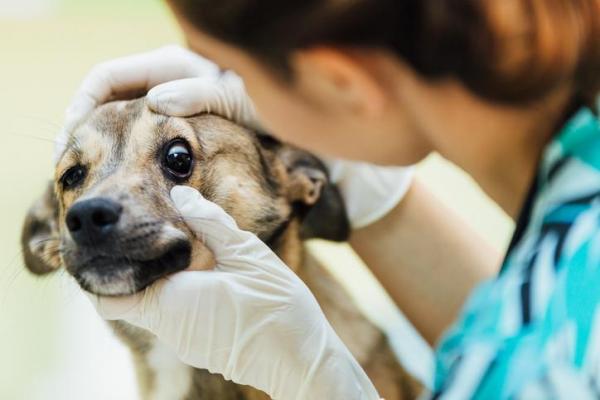
Dislocated eyeball in dogs
In severe cases, an injury can lead to more than redness in the eye. A globe prolapse may occur, another term for a dog's eyeball popping out of its socket. This is when the eye exits the socket and it presents a serious condition for the dog. The injury may be a trauma, but some dogs are more prone to it than others. Selective crossing has lead to some breeds to have the desired characteristic of bulging eyes. This protrusion makes them more vulnerable to many eye conditions[3]. It is sometimes known as canine proptosis or exophthalmos.
You should not try to put the eye back into their eye socket yourself. You can damage the eye further and may even blind the dog. Their eye is also much more vulnerable to infection at this stage. Most proptosis or eye dislocation will still have the eye in the socket, but sometimes it can fall out completely. In these cases, you need to ensure the dog does not try to eat it or break the optic nerve.
The longer it takes to reach assistance, the worse the prognosis for the dog. Around 40% of eyes which are dislocated from the socket in this way will regain vision[4]. However, many cases will result in the eye never regaining proper function and leaving the dog blind in the affected eye. Some severe cases will also result in surgical removal of the eye.
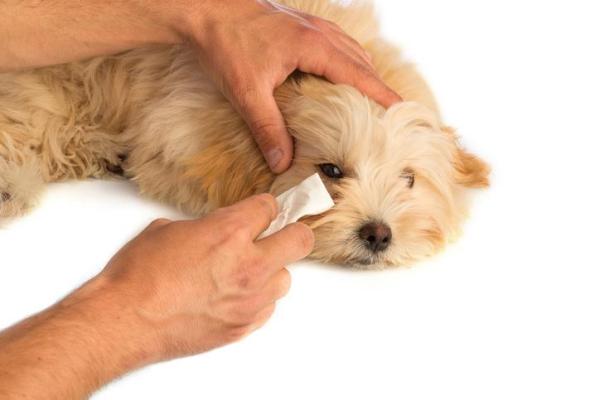
Treatment for redness in a dog's eye
The treatment required for a dog that has bloodshot eyes will depend on the underlying cause. If it is an infection, the eye will need to be cleaned and antibiotics will likely be administered. If there is a cut, then the lesion will be cleaned. Eyeballs heal more quickly than other parts of the body, but some lacerations may need surgery to fix. If this is the case, the veterinarian will refer them to a veterinary surgery. If the problem is chronic, such as glaucoma, then the treatment will be more focused on reducing the effects of the symptoms.
Preventing redness in a dog's eye is not always easy. We need to take them outside to get exercise and many of the foreign objects will enter their eye due to an unavoidable accident. However, you can:
- Take care with brachycephalic dog breeds as they are more prone to eye problems.
- Keep their eyes clean and wash your dog if they get dirty as the dirt can transport to the eye.
- Keep your dog away from brambles and other prickly shrubbery.
- Keep any irritating substances out of harm's way.
- Walk with a leash in areas where injuries are more likely to occur.
- Keep your dog away when working at something where foreign objects are likely to travel (e.g. anything which requires you to wear goggles).

This article is purely informative. AnimalWised does not have the authority to prescribe any veterinary treatment or create a diagnosis. We invite you to take your pet to the veterinarian if they are suffering from any condition or pain.
If you want to read similar articles to My Dog's Eyes Are Bloodshot, we recommend you visit our Eye problems category.
1. O'Neill, D. G., Lee, M. M., Brodbelt, D. C., Church, D. B., & Sanchez, R. F. (2017). Corneal ulcerative disease in dogs under primary veterinary care in England: epidemiology and clinical management. Canine Genetics and Epidemiology, 4(5).
https://cgejournal.biomedcentral.com/articles/10.1186/s40575-017-0045-5
2. Massa, K. L., Gilger, B. C., Miller, T. L., & Davidson, M. G. (2002). Causes of uveitis in dogs: 102 cases (1989-2000). Veterinary ophthalmology, 5(2), 93–98.
https://doi.org/10.1046/j.1463-5224.2002.00217.x
3. Packer, R. M., Hendricks, A., & Burn, C. C. (2015). Impact of facial conformation on canine health: corneal ulceration. PloS one, 10(5), e0123827.
https://doi.org/10.1371/journal.pone.0123827
4. Gelatt, K. (2002). Treatment of Orbital Diseases in Small Animals. Retrieved from:
https://www.vin.com/apputil/content/defaultadv1.aspx?meta=&pId=11147&id=3846252

